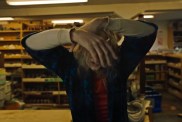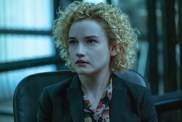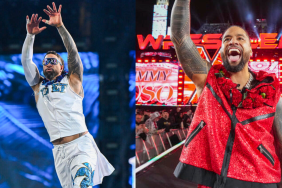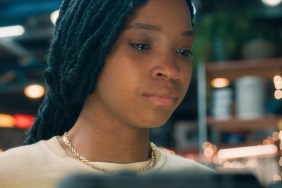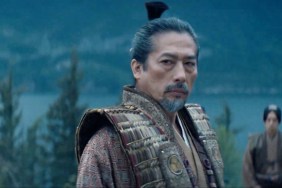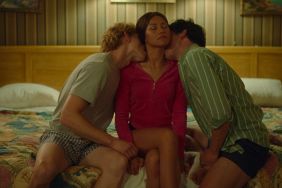Most people’s first awareness of stand-up comic Charlyne Yi was from her appearance as the chronically stoned slacker Jodi in Judd Apatow’s 2007 movie Knocked Up, but at Sundance this year, audiences were able to get a look at Yi’s own very unique sense of humor with Paper Heart, a romantic mockumentary that effectively blurred the line between true romance and the kind that’s been fictionalized by Hollywood and the tabloids.
Like Yi’s stand-up act, Paper Heart plays with what’s real and what’s not, as the actress tries to find the meaning of love interviewing random people on the road to get their opinion. At the same time, we watch as Yi meets fellow actor Michael Cera “for the first time” and a relationship blossoms between them, despite Yi’s insistence that she’s incapable of having a romantic relationship with him.
Two years ago, Michael Cera famously brought Charlyne on stage during the panel for Sony’s Superbad, and unfortunately, a lot of the press surrounding this movie seems to have turned into tabloid fodder about whether they really were or were not a couple either before, during or after the making of the movie. (You might want to note this is one of the few interviews for the movie where we didn’t even ask her about it!)
Even so, Yi made a triumphant return to Comic-Con on a seemingly slower Sunday along with the director of the film, Nicholas Jasenovec, as well as the movie’s fake director, actor Jake Johnson, who was hired to play Nick on camera to further blur reality between the interview portion of the movie and the rest of it. Being Sunday afternoon at Comic-Con, everything was winding down, so when ComingSoon.net sat down with the trio, it was a bit more casual than usual.
In fact, when the trio walked up to introduce themselves, we immediately began talking to Johnson about how most people will automatically assume Jake is the director of the film and have no idea who Nick was, which is where we join the conversation as Jake tells us how pretending to be a director posed some problems while interacting with their interview subjects…
Jake Johnson: The Elvis one especially, Nick wanted me to walk in and introduce myself as “Nick” in case he wanted to use those intros, and Elvis was like “Hey, man, you can do a nice dolly shot coming in here,” and I was like, “Yeah, yeah, yeah, cool, definitely, dolly shot. I’m going to ask that guy over there who is part of the crew to make the final call.”
Nick Jasenovec: (impersonating Jake pretending to be a director) “Put down that track thingy and let’s do this.”
Johnson: “Let’s shoot this baby!”
CS: Was it just the three of you on the road that whole time?
Nick Jasenovec: We were in a 12-passenger van with about ten people total, then we also had a separate truck with equipment and luggage and a driver driving that truck as well.
Charlyne Yi: Two camera guys, one sound guy, assistant, two producers, you, me and Jake.
Jasenovec: And two drivers.
CS: So not a small movie crew at all. I just assumed it was the three of you and maybe two others.
Jasenovec: Yeah, if we had been slightly lower budget we probably would have done that but even though it was very run and gun, we still wanted some sort of production values, so we had a good crew, good team of people.
CS: Why did you need Jake to pretend he was the film’s director? I can understand why an actor might be better for the scripted parts but why did you need him on the road acting as the director of the doc then?
Jasenovec: Really, it was all about creating a reality that carried over from the documentary to the scripted scenes, so we wanted a similar tone and feel and style, and we wanted there to be any jarring differences… and I’m just not a very good actor, so we knew that if the director was going to be a character in the film, we knew we needed someone who was more natural on camera and who could carry a scene with Charlyne or with Mike or whatever. Once we decided that, it was a simple decision. We all knew Jake and all individually worked with him even at that point.
Yi: Yeah, we were big fans of him.
Jasenovec: And we were thrilled he wanted to be a part of it.
CS: Did you feel that maybe Jake should be a director and this was a chance to see if he could pull it off?
Yi: (laughs) Yeah.
Johnson: She always thought I should be a fake director.
Yi: Yeah, finally!
Jasenovec: He was born to be a fake director. (Everyone’s laughing at this point.)

CS: Charlyne, I’m assuming this project started with you, so did you really want to make a documentary about love at one point and then it transformed into this, or did you always plan it to be something rather abstract with the documentary being a part of it?
Yi: In the beginning, I wanted to make a true documentary about love and capture people’s real love stories, and a part of it was because of my own doubts about love for myself. When I came with that idea to Nick, he wanted me to be on camera, which I hadn’t planned on doing. I think he was hoping that I would fall in love during the making of (the movie).
Jasenovec: Yeah, I was like, “You know what would be great? If you met someone on camera while we were shooting the movie and fell in love”… in a five week shoot. And she was like, “Yeah, well that’s not going to happen.”
Yi: It’s probably going to take a couple years.
Jasenovec: So then we decided to create a fictional storyline and blend them together.
CS: Were your early conversations similar to the one in the movie when you were talking to the fake Nick i.e. Jake about making this movie?
Jasenovec: I think I got an Email.
Yi: Yeah.
Jasenovec: Like a really long Email. Like she had mentioned…
Yi: I had asked you about married couples…
Jasenovec: Yeah, she was looking for people. She was doing audio interviews with people.
Yi: I was just seeing if I knew how to get people to open up and talk.
Jasenovec: I don’t think you ever told me what you were doing. It was just like, “Sure, I’ll give you some names” and then one night, I just got this really long Email that broke down what she wanted to do, how she wanted to do it, her ideas for it, and I was like, “Yeah, cool, I’m on board.”
CS: So what was the next step after that? Just going out and interviewing people on camera?
Jasenovec: The next step was figuring out what the story was going to be and just basically coming up with a plan to make the film. We put everything together. We did budgets, we did subject types that we wanted to interview, we did an outline, we did a presentation than we started pitching it.
Yi: We even shot some footage, but we didn’t end up using it.
Jasenovec: Yeah, because there was a fan of Charlyne’s who wanted to propose to his girlfriend at one of her shows, but we didn’t have the money to shoot yet, so we actually paid for it out of pocket and shot the proposal and stuff, but it just ultimately didn’t really work out. We hadn’t quite figured out the style or anything like that so the footage looked much different than what we ultimately ended up with.
CS: About how long ago was that?
Jasenovec: I think it was like… okay, I do know that we didn’t start pitching until about August, and I don’t remember what year it was, but I know that “Superbad” was just about to come out when we started pitching it.
CS: That was 2007, because I remember when they had “Superbad” here at Comic-Con and Charlyne showed up for that. It’s a strange movie to talk about because first of all, people who see it without knowing anything just assume it’s all real and then you start questioning which parts might be fake. After watching it twice, I still have a hard time figuring out which is which. I know you knew Michael before you started filming it so I know you didn’t just meet him on film, but a lot of people won’t know that.
Johnson: Well, everything with me was fake.
Jasenovec: The documentary interviews, those are all real people.
Johnson: We really went on the road from L.A. to New York and did a documentary, so everyone she interviews from the psychic on through was all real, but every time Charlyne and I would be in a scene, that would be fake, and every time Michael would be in a scene, it would be basically…
Jasenovec: Yeah, because then we came back and we shot the entire relationship storyline, which was all scripted in two weeks. I think there was a reason for doing it in that order, but ultimately, it didn’t really affect things too much. I think we definitely captured stuff in the documentary portions that were like “Oh, we can tie that in a little bit.” Nothing too…
CS: How did you convince Michael to be a part of this? Obviously, you were already friends and knew each other, but then trying to create a fake romantic relationship. What did you tell him about what you wanted to do?
Yi: I didn’t really explain my idea well. I think I was so nervous. I really wanted him to do it because he was my first choice. I don’t remember how I said it but I don’t think it made any sense and I had Nick talk to him.
Jasenovec: If I remember, I was like “What did he say?” and you were like, “Oh, I dunno” and she was like “I guess we have to find someone else,” so we literally started thinking, “Well, who else can we get to do it?”

CS: It could have been a whole different movie if you got Seth Rogen or any other actor to do it.
Jasenovec: Yeah, we probably would have instinctively just sort of pulled from our group of friends, so it very easily could have been Seth Rogen and Charlyne Yi falling in love.
Yi: (laughs)
Jasenovec: But we never had to ask anyone else because finally, I talked to Michael, and I guess I just explained it in a way that made a little bit more sense.
Yi: Oh, yeah, and I think he was also excited about the idea of messing with reality.
Jasenovec: He was the perfect choice because he just has a very specific style of acting that fits well with his natural take.
Yi: He’s a big fan of Charlie Kaufman.
CS: That’s funny you should mention that because this does feel like a cross between something like “Adaptation” and… I don’t want to say “Borat” because that’s different but it’s one of those things where you’re not sure what’s happening on the fly and what’s been planned beforehand.
Jasenovec: We were really careful, too. We really love “Borat” and that’s probably the closest comparison, but there’s also for me at least the filming approach, we wanted to be a little bit stricter. I think we broke our rules a couple of times, but we definitely wanted to feel like it was all shot from the same two cameras.
Yi: And also, we made a point of never mocking the subject.
CS: That was always the issue I had with Bill Maher’s “Religulous” because it seemed that he was interviewing people for the sheer purpose of mocking them.
Jasenovec: I never saw it.
Johnson: I know what you’re saying. You see it all through his eyes, and right away, you’re waiting for him to bust them on something, and thinking “Oh, man, this guy is going to get it!”
CS: As far as the puppets you use to tell the stories, was that something that you also knew very early on that was how you wanted to tell their stories?
Yi: Yeah, early on, we were talking about the style of the documentary portion of how it would be shot when they would tell a story. He was like, “We’d push in and be a nice shot” and he was asking me what the B-roll would be, and I was like, “Oh, we could do the still photos…”
Jasenovec: I think that was in that original Email you sent me.
Yi: Oh, it was?
Jasenovec: Yeah, I remember that. I remember you were like, “Yeah, and I had this idea that if there’s a couple and they met at a dance and they’ll be waltzing, maybe we can cut to two paper puppets in the ballroom.”
Yi: Oh, yeah…
Jasenovec: And I was like, “Oh, yeah, that’s really cool.” Obviously, my first reaction was that it was kind of like Michel Gondryesque, but it’s also something Charlyne has done a lot in her live shows with puppets and cardboard props and sets, so it just seemed like a perfect fit for a movie that was kind of an extension of Charlyne.
CS: Had any of you heard of this documentary “Protagonist”? It was a really different type of movie but the filmmaker also used puppets to tell backstories.
Jasenovec: Yeah, I got a copy of it because we have the same commercials’ rep, Jessica Yu and I. I haven’t watched it yet. We haven’t really had much time, but I really want to watch it with Charlyne, but I have a DVD of it at home. I heard it’s great.
Yi: Is it puppets?
Jasenovec: Yeah, she uses–in a similar way that we do I guess…
CS: It’s a really serious and dark film though about how people’s stories being like Greek operas. It really was a completely different movie. Did the title “Paper Heart” also come up fairly early on?
Yi: It came about I think kind of early on when we were thinking of putting a recreation with the puppets where Charlyne and Michael break up, there’s going to be a recreation where there’s a papier mache going (makes cracking sound) and it would split up and become Michael and me and it would hit the bases of our love story, but it was more of a sad thing.
Jasenovec: We shot it, and it was a different style because it was actually stop motion animation with paper figures, and it didn’t fit stylistically with the other ones and it was just really a downer and that section of the film was already depressing, so we didn’t use it, but we always intended to call the film “Paper Heart” because it tied into this core recreation.
Yi: I actually think it’s better that it’s without that because it’s too literal.

CS: But the movie has a different ending now, right? Because I saw it at Sundance and then I saw it again recently, and I wasn’t really sure what had changed, but I was told that the whole animated segment at the end was new? (SPOILER WARNING: The following response is almost DEFINITELY a spoiler so you may want to skip forward a bit.)
Jasenovec: Yeah, it’s basically just an additional ending. It still ends in Toronto with Nick cutting the cameras as she goes into the house, but now a title card comes up that says “After months of editing, Nick felt the film needed a stronger ending…” and then it sets up that Charlyne gave this to him and it cuts to this grand Hollywood version with Charlyne as this tough motorcycle broad and she rescues Michael and takes him back to California. It gets very complicated, but it doesn’t necessarily provide any other information or answers but it’s just a fun way to get out of the film.
Yi: Yeah, we did test screenings and everyone hated the ending. I thought it was hopeful but people would write like, “I didn’t get the ending, this is a downer.”
CS: This was after Sundance…
Yi: Yeah, after Sundance.
Jasenovec: People didn’t like the Sundance ending, the one that you saw.
CS: Really? Because I loved the ending at Sundance and I thought the general response was great.
Yi: I think that like 85% didn’t like the ending. They wanted to know what happened but we didn’t want to compromise what happened but we wanted to give them hopefully a higher note to leave off on, just energy wise?
Jasenovec: You know what it is? I think the most important number from the test screenings was the definite recommends, and so it’s as they’re walking out of the theatre, “Would you recommend the film? Yes… no…” and if the film ends on kind of an ambiguous downer, even if they liked the movie up until that point, they’re like, “I didn’t like the way it made me feel.”
Yi: Yeah, what’s that thing? I feel we learned about that, like how the last couple minutes…
(End of potential spoilers)
CS: It affects everyone because that’s what they remember the most.
Yi: Yeah.
Johnson: That’s what everyone’s been talking about, that last five minutes.
Yi: Even if the movie was like, “Yeah, whatever” but then the ending was great…
CS: I think that was the case with Quentin Tarantino’s latest movie. It was two hours of talking and then the last half hour is like “Holy crap!!!” So I guess you need to save all the best parts until the very end.
Jasenovec: This was my lesson. I’m glad we learned it early. (laughs)
CS: I was just surprised because I remember leaving the screening at Sundance when I was on the shuttle bus and a woman was heartbroken, because she really believed it all was real.
Johnson: We had a guy at Toronto, or I think Montreal…
Yi: Oh, yeah…
Johnson: Where he raises his hand and was like “So now I’m realizing that some of it was fake and some was not real,” and we’re like “Yeah” so he’s like, “It just makes me really sad.” (the way Jake says this makes us all laugh)
Jasenovec: Did you ever see the review? It was some girl writing for a college newspaper that went to Sundance, and she’s like, “I loved the movie. I fell in love with the story, and I’m so happy for Michael and Charlyne… and then the real director came up for the Q ‘n’ A and the director I’d fallen in love with while watching the movie was not real.” She was so sad.
CS: Maybe you can continue to get role playing a director in movies or just keep playing Nick in other movies.
Johnson: (laughs) That’s all I do. If you want to cast Nick Jasenovec in your movie?
Jasenovec: You know what we should do actually for my next movie? ‘Cause it will not be any blurring of realities, but we should shoot a DVD featurette where Jake (plays me)
Yi: Yeah… a callback.

CS: So Charlyne, where do you go from here? I know you’ve done some acting, but is that something you’re still pursuing regularly?
Yi: I’m doing a lot of writing. I think I want to… I’m writing some stuff where I’m supposed to act in it if it gets picked up. I like writing and I also want to perform more and be free from… I think when you make a movie, you kind of get tied to it forever. (laughs) Like this, it’s been two years or so.
Jasenovec: Yeah, it’s been a long process.
Yi: I’m really excited to get back on stage and… I think with film, it’s such a long process that if you think you nailed it in the performance, when you watch it, you’re like “Oh, I don’t know” or if you did nail it, the editing can change it or other people’s input and it’s such a long process to know actually what you have and get a reaction. With performing, you get an instant reaction, whether it’s good or bad, it’s always instant.
CS: I was curious about how much of this you consider “performance” because there are scenes where you’re clearly upset, but was that all scripted and acting?
Yi: (gets excited, almost beaming) Oh, yeah!
Jasenovec: Because Charlyne will be the first to say, “Oh, I’m not an actress, I’m not an actress” but the moment where she breaks down emotionally in the film, that was one of the first things we shot, and it was all acting. We did it like six times and she nailed it the first take and we were all like really impressed. From there, it seemed pretty natural for you.
Yi: Yeah, it was fun.
CS: I remember a few of my colleagues being really impressed with the performance and I mostly remembered you going up to people talking and wasn’t sure how much of this was really acting.
Jasenovec: Yeah, it’s a mixture.
Yi: Yeah.
Jasenovec: I think even in her live shows, there’s a little bit. A lot of people haven’t gotten to see her live shows but a good example is she’ll do a half hour story-based live show, but within the first two minutes, she’ll pull someone up from the audience and they will then become the co-lead in the story, so there’s always in Charlyne’s stuff, or often times, a mixture of reality and fiction. I think that’s why this worked well for her.
CS: I know that Judd Apatow tries to get everyone he works with to write and develop their own material so are you doing anything with him?
Yi: Yeah, me and Paul Rust, he’s a good friend and he’s really funny and he’s in “I Love You, Beth Cooper”… (at this point, the conversation goes off on a tangent about how Rust and Samm Levine spent 3 months in Europe shooting Tarantino’s movie–yes, that again–only to end up in only a few minutes of the movie). So me and Paul Rust are writing for Universal and Judd, but I don’t know if the film is actually going to get greenlit.
And we ended on a funny but semi-spoilery bit, not just for Paper Heart but also a couple other romantic movies in theaters (which we won’t name), that have untraditional endings.
CS: There’s actually a couple movies out this summer–I don’t want to say which ones–that deal with romances that don’t have a happy ending, so it’s interesting how this movie fits in with them.
Jasenovec: Yeah, it’s a fun summer where there’s kind of like a few offbeat stories. I don’t know why. It’s totally unconnected and just random, it’s like “Armageddon” and “Deep Impact”! Replace giant asteroids with quirky love story.
Everyone starts laughing at this analogy and we realize it’s too funny not to end the interview on that high note so everyone remembers what a fun interview this was and goes to see Paper Heart when it opens in select cities on Friday, August 7.
